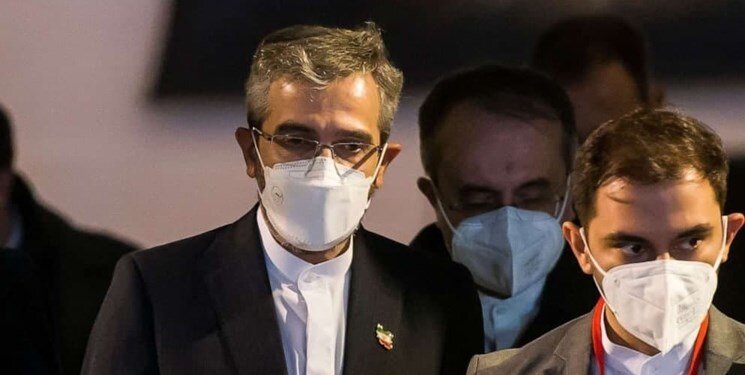Iran received no proposals from other side in Vienna: top negotiator

TEHRAN – Despite having presented two draft proposals in the Vienna talks, Iran has received no proposals from the other side, the top Iranian negotiator said on Sunday.
Ali Bagheri Kani, the deputy foreign minister of Iran who leads the Iranian negotiating team in Vienna, said the talks, however, are moving forward.
In remarks to Press TV on Sunday, Bagheri Kani pointed out that the Iranian side has not received any constructive initiative or proposal from the opposite side during the ongoing negotiations in the Austrian capital.
During the current round, Iran presented two draft proposals regarding the nuclear and sanctions removal measures that needed to be taken by Washington and Tehran if the 2015 Iran nuclear deal, formally called the JCPOA, is to be revived. The Europeans rejected the proposals out of hand before a short break last week. But it seems that they have backed off and started discussing the proposals, though they are still insisting on their maximalist demands that fall beyond the scope of the JCPOA.
Removal of the illegal and cruel U.S. sanctions and Iran’s nuclear activities are two main sticking points in the talks.
Bagheri Kani said despite this situation, Iran’s delegation has informed the opposite side of its views on differential points through modifications and proposals that it has offered.
“When it comes to these points of difference, we have so far received no proposal and initiative from the opposite side,” he said.
The most important points of contention that remain unresolved are removal of “the illegal and cruel” U.S. sanctions and Iran’s nuclear measures, Bagheri Kani further stated.
“These differences are clearly visible in the final draft that was achieved following the sixth round of talks in Vienna… The differences, especially on the nuclear issue, are numerous and varied,” he stated.
Bagheri Kani noted that during the past few days, many sessions have been held both at the expert level and among chief negotiators to discuss modifications, viewpoints, and proposals offered by the Iranian side, which had been applied to the text of drafts drawn up during the sixth round of the talks.
“These talks have been positive and moving forward,” Iran’s top negotiator concluded.
Earlier on Sunday, the lead negotiator told Iran’s state TV that the general atmosphere in the ongoing Vienna talks is very serious, adding that he is optimistic that a final agreement would be reached.
He added that Iran and the five remaining signatories to the JCPOA are holding talks on a host of issues during the seventh round of negotiations, and have reached agreements on some of them, though a comprehensive agreement has not yet been reached on many issues.
“For example, when it comes to Iran's nuclear activities, an agreement has been forged between the two sides on some of [outstanding] issues, but there are other issues in this area...which still remain to be agreed upon and negotiations on those issues will continue,” said Bagheri Kani.
Since Friday, negotiators from Iran and the P4+1 group of countries – China, Russia, France, Britain, plus Germany – have been holding expert sessions to discuss the Iranian proposals that the Europeans called unrealistic and maximalist.
With the start of the seventh round of talks in Vienna on Friday, the sides held discussions about the texts of Iran’s proposed drafts on sanctions removal and nuclear issues during their sessions at different levels, and within different formats, the Iranian foreign ministry said.
In addition to expert sessions, talks and consultations continued at different levels on Saturday.
Mikhail Ulyanov, Russia’s envoy to the talks, said on Sunday that the talks are proceeding smoothly. “The Vienna Talks are underway. A number of meetings in various formats are planned for today. Numerous outstanding issues still remain on the agenda but now, after the break last week, they are addressed properly in accordance with norms and rules of multilateral diplomacy,” he said on Twitter on Sunday.
Earlier, he had expressed surprise at the gloomy Western media narratives of the talks.
“To my surprise some analysts and journalists describe the situation at the Vienna Talks as dramatic, ‘almost deadlock.’ This is not the case in point. After the break the negotiators returned to normal diplomatic business and maintain intensive dialogue. Atmosphere is positive,” the Russian diplomat said.
Iranian President Ayatollah Seyed Ebrahim Raisi has underlined that Iran is serious about the talks. Speaking on Saturday in a meeting with the heads of the missions of the Islamic Republic of Iran in neighboring countries, Ayatollah Raisi said that Iran presenting draft proposals at the talks showed that Tehran is serious about the talks.
Referring to the nuclear talks in Vienna, the president said, “By presenting the text of Iran's proposal in the talks, it was proved to the negotiating parties that we are serious in negotiations and if the other side is determined, the path is clear for reaching an agreement.”
Ayatollah Raisi said, “The most sanctions are in the nuclear, space and military industries, but in these industries, good progress has been made for the country, while in other industries, we have many problems.”
The Vienna talks continued on Sunday with Bagheri Kani holding meetings with European counterparts.
Leave a Comment